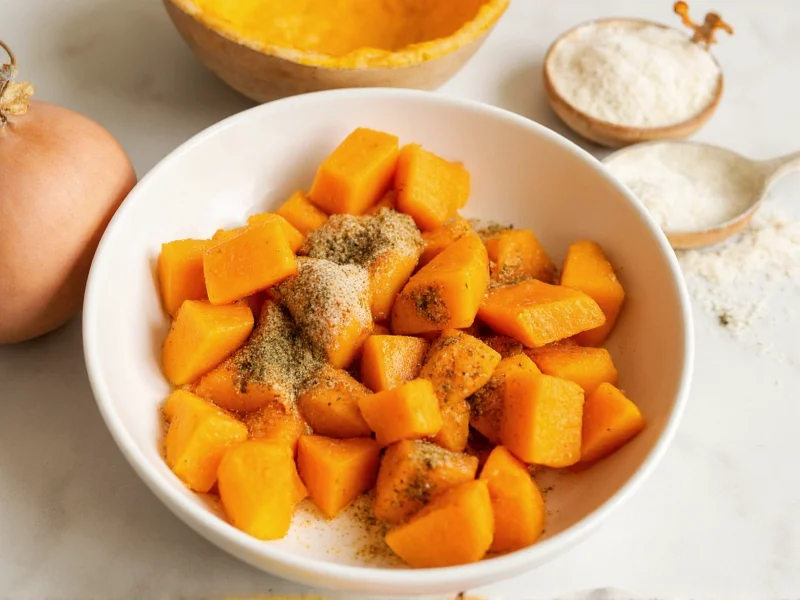Butternut squash's naturally sweet, nutty flavor creates a versatile canvas for seasoning. Understanding how to enhance its earthy sweetness while balancing its mild bitterness transforms this winter squash from ordinary to extraordinary. The key lies in matching seasonings to your cooking method and desired flavor profile.
Understanding Butternut Squash Flavor Chemistry
Butternut squash contains natural sugars that caramelize beautifully when roasted, creating complex flavor compounds. Its subtle bitterness responds well to balancing elements—sweetness counteracts bitterness, while acidity brightens the overall profile. When considering what spices go well with butternut squash, focus on complementary flavor compounds that enhance rather than overwhelm.
Essential Seasoning Principles
Professional chefs follow three fundamental principles when developing the perfect seasoning blend for butternut squash:
- Layering: Apply seasonings at multiple stages—before cooking, during cooking, and after cooking
- Balance: Counteract natural bitterness with sweetness and acidity
- Complementarity: Choose seasonings that enhance rather than compete with squash's natural flavor
Classic Seasoning Combinations
These proven pairings work across various cooking methods. For how to season butternut squash for roasting, these combinations deliver consistent results:
| Flavor Profile | Seasoning Blend | Best Cooking Method |
|---|---|---|
| Classic Roasted | Olive oil, salt, black pepper, thyme, garlic powder | Roasting at 400°F |
| Warm Spice | Coconut oil, cinnamon, nutmeg, ginger, pinch of cayenne | Roasting or pureeing |
| Mediterranean | Olive oil, rosemary, sage, garlic, lemon zest | Roasting or sautéing |
| Maple-Spice | Maple syrup, cinnamon, nutmeg, salt, apple cider vinegar | Roasting or baking |
Advanced Seasoning Techniques
For seasoning butternut squash before roasting, proper oil selection matters as much as spices. High smoke point oils like avocado or refined coconut oil carry fat-soluble flavor compounds better than olive oil for high-heat roasting. Toss cubed squash with oil first, then add dry seasonings to ensure even coating.
When preparing best seasoning for mashed butternut squash, incorporate seasonings gradually. Start with 1/2 teaspoon salt per pound of cooked squash, then adjust. Add acidity (lemon juice or apple cider vinegar) at the end to brighten flavors without breaking down the puree.
Global Flavor Inspirations
Expand beyond basic seasonings with these international approaches:
- Moroccan-inspired: Cumin, coriander, cinnamon, ginger, and a touch of harissa
- Asian fusion: Toasted sesame oil, five-spice powder, ginger, and rice vinegar
- Mexican-style: Smoked paprika, cumin, oregano, and lime juice
- French herb: Tarragon, chives, parsley, and a splash of white wine
These global variations demonstrate seasoning ideas for baked butternut squash that transcend basic preparations while respecting the squash's inherent flavor.
Timing Matters: When to Season Butternut Squash
The timing of seasoning significantly impacts flavor absorption. For roasted preparations, apply 70% of seasonings before cooking and 30% after. The initial application penetrates during cooking, while the final addition provides aromatic top notes. For soups and purees, add delicate herbs like basil or cilantro at the very end to preserve their fresh flavor compounds.
Understanding how much salt for butternut squash requires attention to cooking method. Raw squash needs more salt (about 3/4 teaspoon per pound) as some gets lost during cooking, while pre-cooked squash for mashing requires less (1/2 teaspoon per pound).
Fresh vs. Dried Herbs: What Works Best
While dried herbs work well for roasting (their concentrated flavor withstands high heat), fresh herbs shine in finished dishes. For best herbs for roasted butternut squash, use dried sage, thyme, or rosemary during cooking, then finish with fresh versions. The volatile oils in fresh herbs provide aromatic complexity that dried versions lack.
Avoiding Common Seasoning Mistakes
Even experienced cooks make these seasoning errors with butternut squash:
- Over-sweetening: Butternut squash is naturally sweet—use sweeteners sparingly
- Under-salting: Squash requires more salt than you might expect to balance bitterness
- Mixing conflicting spices: Avoid combining warm baking spices with strong savory herbs
- Adding delicate ingredients too early: Citrus zest and fresh herbs lose flavor when cooked too long
Perfecting Your Seasoning Approach
Developing ideal spice combination for butternut squash requires understanding your specific squash variety and cooking equipment. Smaller squash tends to be sweeter, requiring less added sweetness. Convection ovens caramelize faster, potentially needing reduced sugar content. Always taste and adjust seasonings at multiple stages—raw, during cooking, and finished—to create balanced flavor.











 浙公网安备
33010002000092号
浙公网安备
33010002000092号 浙B2-20120091-4
浙B2-20120091-4